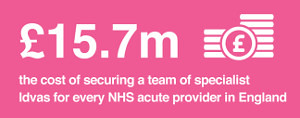Key findings
 It makes neither human nor financial sense to ignore the needs of victims and their children – and without this provision, we will continue to fail people who most need help. We have listed our key findings below. For more details on these and additional context, please see our full policy report, A Cry for Health.
It makes neither human nor financial sense to ignore the needs of victims and their children – and without this provision, we will continue to fail people who most need help. We have listed our key findings below. For more details on these and additional context, please see our full policy report, A Cry for Health.
1) Health and domestic abuse are inextricably linked.
Domestic abuse has a profound and long-term impact on our physical and mental health. And victims who seek medical assistance are more likely to have mental health difficulties, substance misuse issues and additional vulnerabilities.
- Our research found that almost 60% of victims identified in hospital had mental health concerns (compared with 35% of victims who engaged with a community service)
- Just under half (49%) of victims identified in hospitals had post-traumatic stress disorder (PTSD) compared to 6% of community victims
- One in six (16%) had been to A&E for an overdose in the last six months, compared to 3% of community victims
We need to address mental health issues as well as the domestic abuse that victims are suffering. Unless we do this, our current efforts to reduce one or the other will be seriously undermined.
Domestic abuse isn't just about the injuries we can see: the hidden harm to victims and children is even greater.
2) We are missing opportunities to support victims and reduce the impact on their health and wellbeing.
This issue cannot and should not be dealt with by the police alone. The Crime Survey England and Wales found that four out of five victims do not call the police. Health professionals are ideally placed to identify victims; our research found that 56% of hospital victims had accessed A&E in the year before getting help. These missed opportunities to intervene are especially important for victims who are not in contact with other agencies.
Our research showed clearly, that without the provision of specialist support to respond to a disclosure of domestic abuse, clinical staff are unlikely to ask about it.
"There is no point asking the question if we’re not going to do something about it. It’s like opening a nasty cut and not doing anything about it”
~
Nurse
Currently, victims go to hospital, visit their doctor, talk to their midwife. And yet all too often, we are not asking the question. In about half of cases, victims are being discharged back into the arms of the perpetrator who put them there.
“We found people we were identifying through A&E were not known by other services”
~
Commissioner
3) Domestic abuse already puts enormous strain on our NHS. With a small investment, we can unlock the potential in our health service and make victims safer, faster.
Domestic abuse costs £1.73 billion to the NHS already. Our doctors and nurses already do an incredibly tough job. We cannot expect them to find the time and space to ask the question, in the right environment that supports a victim to disclose, without specialist services to refer onto. We must have clear referral pathways to specialist domestic abuse provision with the training and focus to reassure victims and support them in their long journey to being safe and well.
"We do leave a lot of work to them [Idvas]... They do so much more with patients than we could ever dream of doing because of time. Their role is so important. I don’t know what we would do without them”
~
A&E Consultant
Our research has found that it would only cost £15.7m for every NHS acute provider to have a robust Idva service. That is £100,000 per hospital. It would provide help for 15,000 additional victims a year.
